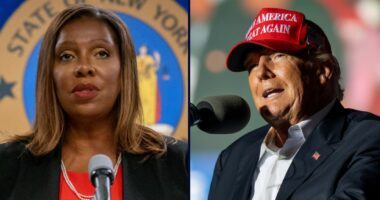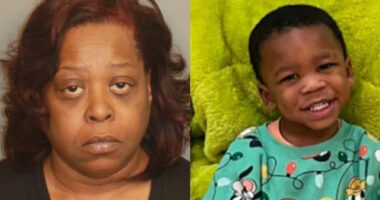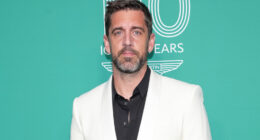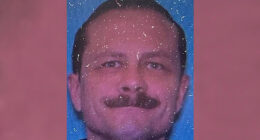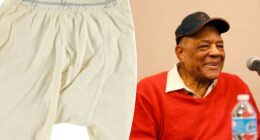
Main: Hotel video from 2016 shows Diddy abusing ex-girlfriend Cassie Ventura (CNN/YouTube). Right inset: Sean P. Diddy Combs at the premiere of Lawless held on August 22, 2012 at the ArcLight Cinema in Hollywood, Los Angeles, California (zz/RE/Westcom/STAR MAX/IPx).
Federal prosecutors told the judge in Sean “Diddy” Combs‘ RICO and sex trafficking case that the defendant can’t show a 2016 video of him abusing his ex-girlfriend Cassie Ventura at a Los Angeles hotel was grand jury material leaked to CNN and that he isn’t entitled to know alleged victims’ names some six months before trial, since that would create a “risk of obstruction of justice and witness tampering from prison.”
The U.S. Attorney’s Office for the Southern District of New York on Wednesday filed a response spanning more than 40 pages to the defense’s demands for an evidentiary hearing on its grand jury leak claims, a bill of particulars identifying victims, and a gag order barring “extrajudicial statements from prospective witnesses and their lawyers” as the civil lawsuits against Combs pile up.
Prosecutors told U.S. District Judge Arun Subramanian that each of Combs’ motions “should be denied in their entirety.”
The Cassie abuse video
Defense attorney Marc Agnifilo has argued that the Department of Homeland Security (DHS) was “most likely” the “source” that handed CNN — in May 2024 — a 2016 video of Combs beating Cassie Ventura at the Intercontinental Hotel in Los Angeles.
Prosecutors disputed that claim from the start, but the defense went so far as to speculate that the “leak” to CNN was timed for May 17 former President Donald Trump’s hush-money trial in Manhattan was on pause for that day as he attended son Barron Trump’s high school graduation — making it “a slow news day” and a “perfect time” for the abuse video to come out and “mortally wound the reputation and the prospect of Sean Combs successfully defending himself against these allegations.”
For that reason, Combs’ lawyers asked that Subramanian keep the video out of evidence.
The feds have now countered that Combs has no “factual basis” to “suppress highly probative evidence” of him “brutally physically assaulting a victim” because the video wasn’t grand jury material and wasn’t leaked by prosecutors.
Calling the defense motion “desperate” and a “bald attempt to suppress a damning piece of evidence,” prosecutors told the judge that the video “was not in the possession of the Government at the time of its publication” by CNN and that it “has never been a record obtained through grand jury process.”
“Nonetheless, in the Leak Motion, the defendant baselessly accuses ‘DHS’ agents—who have no authority to issue grand jury process—of secretly obtaining the Intercontinental Video unbeknownst to the prosecutors conducting the investigation and then leaking it to CNN,” prosecutors said. “No evidentiary hearing is necessary to reject these assertions as incredible.”
After the 2016 video went public in May, four months before his indictment, Combs did not dispute what the hotel footage showed but claimed he was “disgusted” when “I did it.”
“My behavior on that video is inexcusable. I take full responsibility for my actions in that video,” Combs said in a video he posted on social media. “I was disgusted then when I did it. I’m disgusted now.”
From there, Combs said that he “sought out professional help” and “got into going to therapy, going to rehab.”
“I had to ask God for his mercy and grace,” he said, before offering an apology. “I’m so sorry. But I’m committed to be a better man each and every day. I’m not asking for forgiveness. I’m truly sorry.”
Read the government’s lengthy response here.
The bill of particulars to identify victims
Prosecutors stated that Combs is not entitled to know, at this stage, the identities of the alleged victims in the case because that would open the door to potential obstruction or witness tampering and because the motion amounts to a “thinly veiled attempt to restrict the Government’s proof at this early stage of the case and to hijack the criminal proceeding so the defendant can respond to civil lawsuits.”
The government said that the indictment contains enough detail about the charges against Combs and that there’s “no reasonable risk that the defendant will suffer unfair surprise at trial,” so any move that may imperil “witness safety” should be “squarely rejected.”
In a footnote, prosecutors added that the fact of Combs’ pretrial detainment doesn’t make “serious concerns” about potential witness tampering or obstruction go away:
That the defendant is incarcerated should not affect this conclusion. The risk of obstruction of justice and witness tampering from prison—although reduced—is not nonexistent and, as detailed in the Indictment, the defendant often used loyal intermediaries to accomplish his objectives, which he could do from prison or out on bail. There is no effective way to guarantee that he will not continue to attempt to do so, even from jail.
While the defense has asserted that Combs needs to know accusers’ names so he can get a fair trial and respond to civil lawsuits he’s called “opportunistic,” the government said that was “blatantly improper.”
“As the defendant well knows, there is zero legal authority for his attempt to co-opt this criminal proceeding to defend against civil litigation,” prosecutors said.
The gag order demand
Prosecutors argued a request to gag “prospective witnesses and their lawyers” is just another defense tactic, like the bill of particulars motion, geared towards forcing the government to “prematurely disclose its witness list.”
“Not only would the Government’s compilation of such list at the outset of its case and while it is continuing to investigate be a fool’s errand, but such relief would be unprecedented,” prosecutors said.
If Combs really wants gag orders, he can seek them within the confines of the civil lawsuits he’s facing, the response continued.
“To date, cases alleging sexual misconduct against the defendant have been filed in state and federal courts, including several in this District. These cases were filed both before the Indictment in the present case, as well as after. Those cases are presided over by capable and experienced judges who are free to assess whether any sort of gag order is appropriate and to fashion remedies,” the government noted.
The expansive “blanket gag order” Combs has asked of Subramanian would be “unprecedented,” prosecutors added.
Read the government’s lengthy response here.
Have a tip we should know? [email protected]

